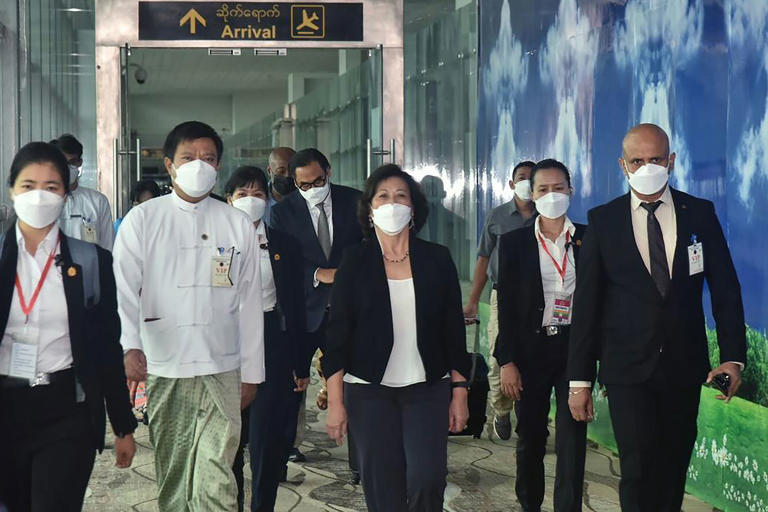Myanmar Spring Chronicle – August 18 Scenes
MoeMaKa, August 19 2022
The result of the United Nations’ Special Envoy’s trip
Noleen Heyzer, the United Nations’s special Envoy for Myanmar, arrived in Myanmar 2 days ago, and had already met with the leader of the military council, the Foreign Minister of the military council and Lieutenant General Yar Pyae, who is also a member of the military council and is mainly responsible for the peace talks. The United Nations (UN) announced at the beginning of the trip that it would meet with people related to the crisis in Myanmar, but it did not say the names of the person or organization it would meet besides the military council.
Regarding the UN, I have noticed that the people of Myanmar have views that expect more than what they could do. The UN is a large organization after World War II that intervenes and resolves problems between countries, and manages funds contributed by developed countries, providing humanitarian aid; refugee assistance; development assistance; health care; cooperative assistance when it comes to global pandemic disasters; assistance for Children’s rights and assistance in educational matters. After decades of formation, the group’s influence has waned to intervene and resolve political issues, some civil wars and wars fought by one country against another.
Big countries that contribute a lot of money to the UN and the countries that have the world’s most powerful military and powerful economy, are no longer paying attention to the UN in dealing with global issues, and they are acting and doing things on their own. And as for the UN, it has become like a big group that only conducts refugees’ aid, social matters, heath care and educational matters, which are a result of the political problem, and it is becoming less powerful to intervene in human rights violations, injustice and in international intervention or internal affairs. As the years go by, there are fewer and fewer instances where political problems can be solved. In cases like the 1963 Cuban Missile Crisis, there were examples of the UN being able to intervene in political crises. But in recent cases, like Ukraine and in matters like Taiwan and China, the powerful countries no longer care about the role of the UN, and the UN is not even in a position to try to intervene. Over the past 3 to 4 decades, there have been many instances of armed forces of powerful countries entering a country’s territory and toppling it on the pretext of the fall of a dictator and, because the UN was not able to intervene in these events, the role of the UN was not seen as big before and during the recent war in Ukraine.
It is seen that the UN is unable to take effective action in cases in which powerful countries invade in their own way. Therefore, we will see that the number of instances of the UN sending peacekeeping forces to do R2P is decreasing.
On the Myanmar issue, it seems that larger countries do not expect the role of the UN so much and they only assume the UN as an organization to provide humanitarian assistance to refugees. It will be seen that the understanding of the world’s powerful countries has more or less effects on the rest of the countries.
Therefore, if you look at this itinerary of the UN Special Envoy in that approach, there will be no special surprise. To provide humanitarian aid to people in the midst of conflicts, although it is true that the agreements involving armed forces and political organizations are necessary, we need to understand that the United Nations doesn’t have the delegation that can solve the political issues, the respect and recognition of those who are involved.
Even in the Ukraine-Russia war which is occurring between one country and another with millions of people fleeing as refugees and losing the lives of hundreds of people, sometimes thousands over a few days, the UN Security Council has no much effective influence. By looking at this, there is little hope that the UN can intervene to change the situation in Myanmar.
The international community, including some neighboring countries, considers the Myanmar issue to be a domestic issue and in terms of military politics, it seems that they have decided not to get involved in Myanmar’s internal armed conflicts, either frankly or behind the scenes. Therefore, in the current armed revolution, I see that we have to continue the revolution relying on ourselves.
I started to see that we should focus on how to solve the problem practically, instead of wasting our time arguing about hoping for something like R2P and the UN peacekeeping army.

